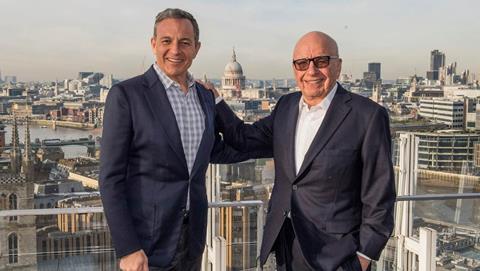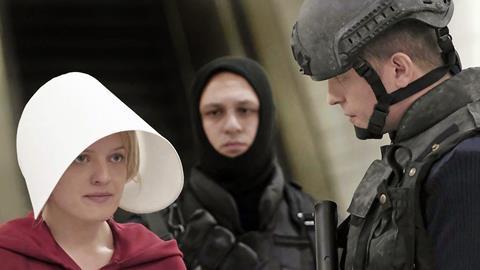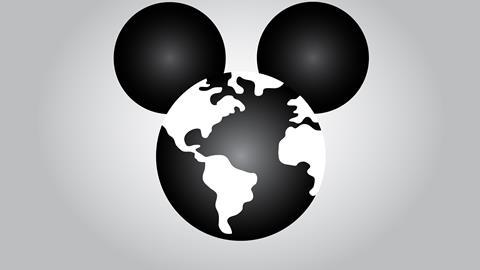Disney’s deal for Fox will give the media giant global reach and the ability to sell direct to consumers, but will it be enough to compete with the growing threat from the likes of Netflix and Google?
Last week 21st Century Fox agreed to sell its entertainment businesses to Walt Disney in a stock and debt deal worth $66bn that is designed to give the new combined company the firepower to stand up against deep-pocketed global tech giants such as Netflix and Google.
The question is, will it be enough?
Rupert Murdoch, the 86-year-old scion of the Fox empire, says he sees the handwriting on the wall and that the media game has been irrevocably changed with the rise of global streaming technology.
“From a strategic point of view, this is the right time to sell,” the grandmaster of media told reporters and analysts when the deal was announced.
“We are living in an age of disruption.”

Talk about the pot calling the kettle black: Murdoch has always been the disruptor, from the 1960s when he bought The Sun and shook the newspaper business to its core, to the early 1990s when he bet on satellite TV broadcasting with Sky TV and nearly went bankrupt.
Now the great disruptor is conceding his mantle to others.
Murdoch has seen what the internet has done to books and to newspapers and now the same is happening to TV and film.
In the latest auction for Indian cricket rights Murdoch’s Asian pay TV platform Star TV found itself bidding against Facebook. Facebook lost, but Murdoch described the bid as “a warning shot” from the social media giant with big aspirations.
The media game may have changed but Murdoch clearly thinks that the new combined Disney-21st Century Fox has a chance.
“When Disney – and Fox - pull all their programmes back, or stop selling anything to Netflix, it will be interesting how that affects them,” he told reporters.
Fox is not selling to Disney certain assets that might cause regulators to nix the sale or that Murdoch simply won’t part with, including the Fox Broadcasting network and stations, Fox News Channel, Fox Business Network, and its sports channels FS1, FS2 and Big Ten Network.
Disney already owns the ABC broadcast network in the US as well as ESPN sports network. The Fox News channel is near and dear to Murdoch, who has been running it since the resignation of former chief Roger Ailes resigned last summer amid sexual harassment allegations.
Murdoch told reporters last week that Trump called him to congratulate him on the sale to Disney. Murdoch will place the assets that are not part of the sale to Disney in a new listed company that will be spun off to its shareholders and headed by Murdoch and his eldest son Lachlan.
Murdoch’s younger son James Murdoch, the man who once seemed destined to take over the family entertainment empire, will be part of the integration of Disney and Fox but beyond that Disney CEO Bob Iger would not be drawn.
The new combined Disney/Fox will have a formidable global footprint, with Fox adding its international channels business, including FX and Nat Geo, as well as the 21st Century Fox film studio and its 39% stake in Sky Europe, which operates in the UK, Germany and Italy, with the potential to acquire control, subject to UK regulatory approval which could be facilitated by the removal of Fox News from the equation.
Fox’s international programming and distribution businesses, including the producer of Big Brother Endemol Shine will also broaden the combined company’s reach and give it even more assets to fuel its own direct to consumer businesses.
These two things together- global reach and selling direct to consumers - are seen by Murdoch and Iger as the most important weapons in this latest round of the media wars.
Disney has already made strides in the direct to consumer (DTC) area, earlier this year buying a majority stake in the OTT streaming technology platform provider BAMTech and also announcing it will no longer sell its programmes to Netflix once its current deals expire.
Disney is creating DTC propositions for sports broadcaster ESPN and a family-focused service to include Disney, Marvel and Pixar brands and franchises such as Star Wars.
Buying Fox will also give Disney another 30% of Hulu, the US streaming service with some 14m subscribers.

Hulu hit the headlines recently when The Handmaid’s Tale, its series based on the dystopian novel by Margaret Atwood, won eight Emmys in September 2017.
The move to add scale in the battle with the Silicon Valley giants is also part of the strategic agenda of other big media and telecom companies with AT&T’s $85bn bid to buy Time Warner being only the latest.
The sticking point there has been CNN, a bugbear to President Trump which he calls “fake news”. AT&T is keen for the deal to go through to give it the content assets it needs to make its telecom network more attractive to consumers but the US Justice Department has called the AT&T- Time Warner combination anti-competitive and so the deal is heading to court.
Is the Disney – Fox deal a response to an existential threat? The head of CBS Les Moonves is on record saying that the TV industry around the world faces a “tough future” from the big tech companies.
“We’re competing with companies that could eat us alive financially,” Moonves said at a business event in Washington in September soon after his company purchased Australia’s Network Ten.
This is no longer about Disney fighting Viacom or Comcast/NBC Universal.
Reading the TV tea leaves –diminishing traditional television viewing, cord cutting and the rise of Facebook, Amazon, Apple, Netflix and Google – collectively known as FAANG - means that scale to better compete for content and customers’ attention is crucial.

























No comments yet